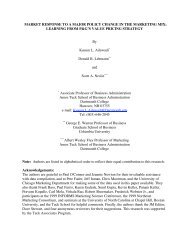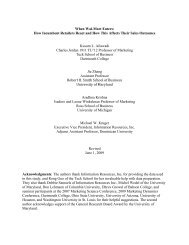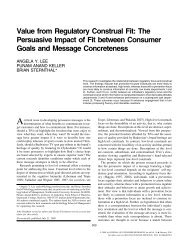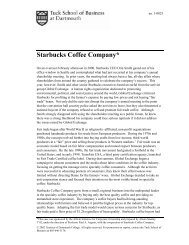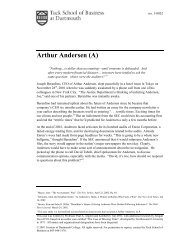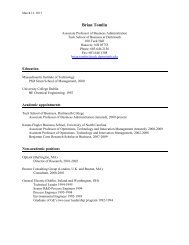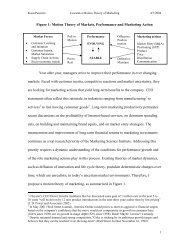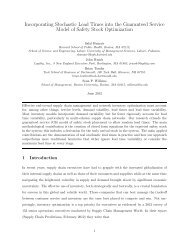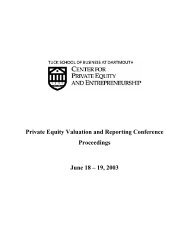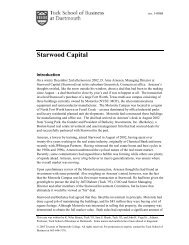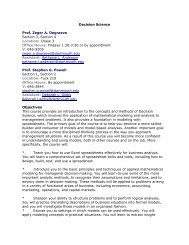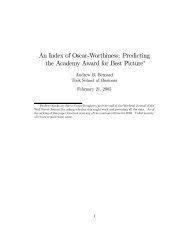tax notes international - Tuck School of Business - Dartmouth College
tax notes international - Tuck School of Business - Dartmouth College
tax notes international - Tuck School of Business - Dartmouth College
You also want an ePaper? Increase the reach of your titles
YUMPU automatically turns print PDFs into web optimized ePapers that Google loves.
HIGHLIGHTS<br />
by a Canadian <strong>tax</strong>payer and used to finance a foreign<br />
affiliate that in turn made some kinds <strong>of</strong> intragroup<br />
loans that generated deductible interest in another jurisdiction<br />
(double dipping). These more modest provisions<br />
were ultimately enacted in the form <strong>of</strong> section<br />
18.2 <strong>of</strong> the Income Tax Act (Canada), effective after<br />
2011, and remain controversial because <strong>of</strong> both their<br />
underlying rationale and the uncertainty <strong>of</strong> their application<br />
in a variety <strong>of</strong> circumstances. (For prior coverage,<br />
see Doc 2007-7732 or 2007 WTD 60-1; see also Doc<br />
2007-11796 or 2007 WTD 94-1.)<br />
The Advisory Committee’s Report<br />
An <strong>of</strong>fshoot <strong>of</strong> the 2007 budget was the minister <strong>of</strong><br />
finance’s establishment <strong>of</strong> an advisory committee to<br />
review Canada’s <strong>international</strong> <strong>tax</strong>ation system and<br />
make recommendations. The advisory committee delivered<br />
its report to the minister in December 2008, making<br />
a number <strong>of</strong> detailed recommendations concerning<br />
both inbound and outbound <strong>tax</strong>ation. (For prior coverage,<br />
see Tax Notes Int’l, Jan. 26, 2009, p. 345, Doc 2009-<br />
84, or2009 WTD 15-11.)<br />
Among the report’s recommendations were:<br />
• Canada should move to a broader exemption system<br />
for <strong>tax</strong>ing foreign-source active business income<br />
earned through foreign affiliates;<br />
• the Department <strong>of</strong> Finance should reconsider the<br />
need for the FIE/NRT rules, in particular with a<br />
view to reducing complexity and overlap in Canada’s<br />
antideferral regimes (while ensuring that passive<br />
foreign-source income earned by Canadian<br />
<strong>tax</strong>payers is <strong>tax</strong>ed on a current basis); and<br />
• ITA section 18.2 should be repealed, and no new<br />
interest deductibility restrictions should be imposed<br />
on borrowing to finance foreign affiliates <strong>of</strong><br />
Canadian <strong>tax</strong>payers. 2<br />
The Budget<br />
The budget’s most important business <strong>tax</strong> measure<br />
is the announcement that ITA section 18.2 would be<br />
repealed as recommended by the advisory panel. The<br />
government cited the negative effect that this provision<br />
could have had on foreign investment by Canadian<br />
multinationals. This development should please that<br />
segment <strong>of</strong> the <strong>tax</strong> community. In the current economic<br />
environment more than ever, Canadian businesses<br />
must be competitive <strong>international</strong>ly in order to<br />
survive, and a disadvantageous <strong>tax</strong> system is an illogical,<br />
unnecessary cost. The government should be commended<br />
for assembling a very knowledgeable panel <strong>of</strong><br />
experts and then acting on their advice. The repeal <strong>of</strong><br />
2 Measures against a specific practice referred to as debt<br />
dumping were advocated.<br />
section 18.2 is a very important and welcome development<br />
for Canadian business.<br />
The budget also indicates that the government has<br />
carefully considered the advisory panel’s views on<br />
other elements <strong>of</strong> the outbound <strong>tax</strong>ation regime. The<br />
budget states that the government will: review the existing<br />
FIE/NRT rules in light <strong>of</strong> the advisory panel’s<br />
comments and the many submissions it has received<br />
about them; and consider the advisory panel’s comments<br />
on the foreign affiliate system before proceeding<br />
to enact the outstanding measures contained in the<br />
2004 foreign affiliate amendments (a number <strong>of</strong> which<br />
would be unnecessary under a full exemption regime).<br />
Although statements about reconsidering legislative<br />
initiatives that have been so heavily criticized do not<br />
constitute an outright abandonment <strong>of</strong> those proposals,<br />
they are a positive development for the many <strong>tax</strong>payers<br />
who are overwhelmed by the complexity <strong>of</strong> the <strong>tax</strong><br />
system — and these provisions in particular — and<br />
who would welcome simpler, more narrowly targeted<br />
rules that do a better job <strong>of</strong> focusing on the real areas<br />
<strong>of</strong> potential abuse. Many <strong>of</strong> the current proposals are<br />
simply not working satisfactorily, and it would not be<br />
surprising if these statements are the first step toward a<br />
larger redesign <strong>of</strong> the outbound <strong>tax</strong>ation system. The<br />
government should again be commended for listening<br />
to the business community. Making the entire outbound<br />
<strong>tax</strong>ation system simpler, more efficient, and<br />
more <strong>international</strong>ly competitive would significantly<br />
boost the Canadian economy.<br />
Other <strong>Business</strong> Tax Measures<br />
Accelerated Capital Cost Allowance<br />
Capital cost allowance (CCA) is the Canadian <strong>tax</strong><br />
version <strong>of</strong> the accounting concept <strong>of</strong> depreciation. Under<br />
the CCA system, the cost <strong>of</strong> capital property is<br />
deducted from income over a period <strong>of</strong> years on a declining<br />
balance basis, 3 matching (to some degree) the<br />
expenditure on the property to the business income it<br />
produces.<br />
The 2007 budget provided a temporary incentive to<br />
invest in capital equipment by accelerating the rate at<br />
which CCA could be claimed (thereby allowing a<br />
larger deduction from income sooner for <strong>tax</strong> purposes)<br />
on eligible machinery and equipment used in manufacturing<br />
and processing. Instead <strong>of</strong> the usual 30 percent<br />
declining balance CCA rate generally applicable, the<br />
3 Declining balance means that the depreciation rate is applied<br />
in each year against the remaining portion <strong>of</strong> the property’s cost,<br />
such that each year’s deduction is smaller than the preceding<br />
year’s. For example, a C $100 property depreciated at 50 percent<br />
on a declining balance yields a C $50 deduction in year 1 (C<br />
$100 x 50 percent), a C $25 deduction in year 2 (50 percent x (C<br />
$100 - C $50)), and so forth.<br />
384 • FEBRUARY 2, 2009 TAX NOTES INTERNATIONAL<br />
(C) Tax Analysts 2009. All rights reserved. Tax Analysts does not claim copyright in any public domain or third party content.



